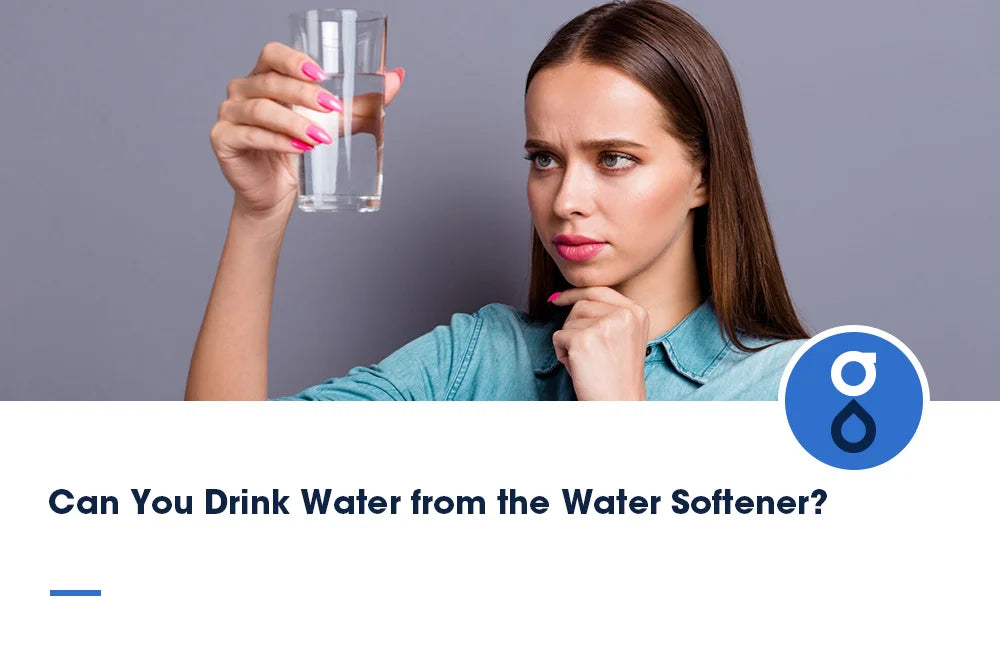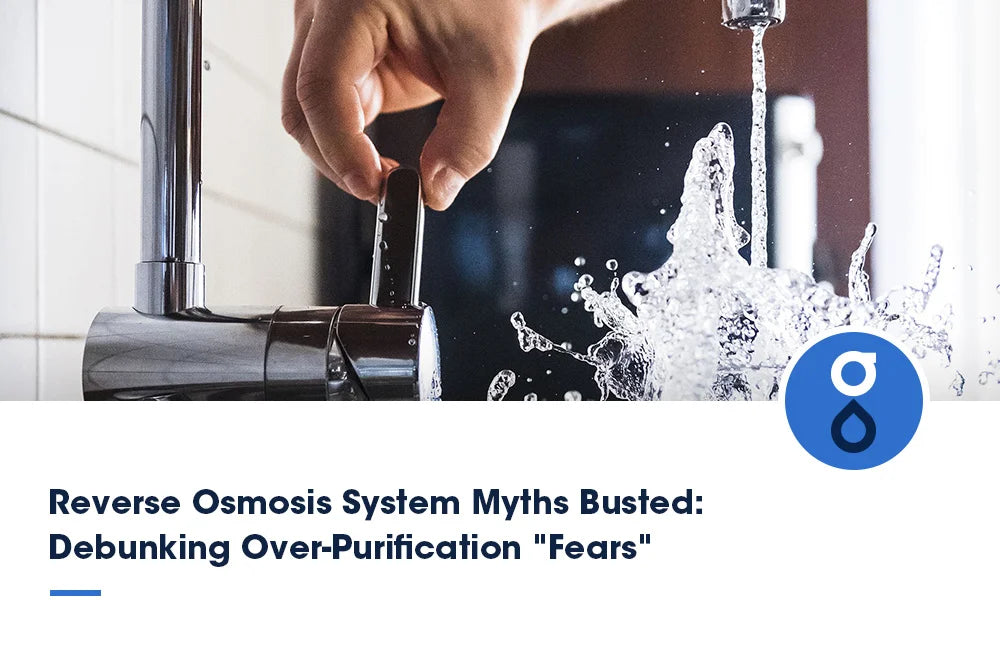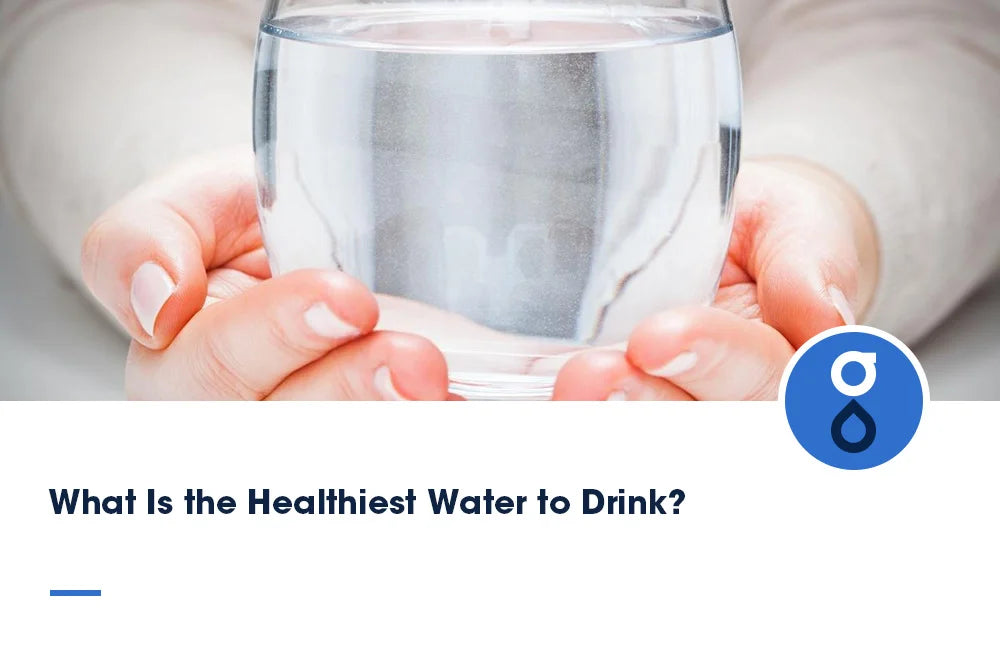Table of Contents:
What Is a Water Softener and How Does It Work?
Softened vs. Tap Water: What’s the Difference?
Why is a Reverse Osmosis System a Better Choice for Drinking Water?
When to Choose a Water Softener vs. A Reverse Osmosis System?
Which System Should You Choose for Your Home?
Final Thoughts
The short answer is: yes, you can drink water from the water softener. Although most people don’t need to worry about it, softened water isn’t ideal to drink every day. That’s because softeners do not purify water — they merely reduce its hardness by swapping out minerals such as calcium and magnesium for sodium. A reverse osmosis (RO) system is the way to go for pure, delicious, and healthy water, not a water softener system.
In this guide, we will tell you how water softeners work and how they compare to reverse osmosis systems. So that you can get a clear answer to the question.
What Is a Water Softener and How Does It Work?

A water softener is a home appliance that removes “hardness” from water. Hard water has high levels of minerals like calcium and magnesium, which can cause mineral deposits in sinks and clogged pipes, and make soap less effective.
A water softener addresses this issue through a mechanism known as ion exchange. Here’s how it works:
-
Water passes through a tank of resin beads.
-
These beads are sodium (or sometimes potassium) loaded.
When hard water runs through them, the resin beads trade the calcium and magnesium ions it has collected for sodium ions, replenishing your water softener with each regen cycle.
The result is soft water with little impact on plumbing, water heaters, and appliances.
But, it’s crucial you realize this: water softeners do not filter out anything else. They do not remove chlorine, lead, bacteria, or harmful chemicals. So, then, while softened water is good for your appliances and your skin, it’s not inherently cleaner or healthier to drink.
Softened vs. Tap Water: What’s the Difference?
Softened water and regular tap water may look the same, but they’re quite different in composition and purpose.
Let’s break it down:
|
Feature
|
Tap Water
|
Softened Water
|
|
Contains calcium/magnesium?
|
Yes
|
No (replaced with sodium)
|
|
Good for plumbing?
|
No (causes scale buildup)
|
Yes (prevents scaling)
|
|
Safe to drink?
|
Often yes, but it may contain contaminants
|
Technically, yes, but high sodium
|
|
Tastes better?
|
Depends on the source
|
Some say yes, others notice saltiness
|
|
Filtered?
|
Only basic municipal treatment
|
No filtration included
|
Softened water can contain added sodium, especially if the water is very hard. For instance, if your water contains 10 grains per gallon (mpg) of hardness, softening it could add approximately 75 mg of sodium per liter. This is not harmful for most people, but it can be a concern for babies, older adults, and people on low-sodium diets.
More critically, softened water does nothing to filter out toxins, bacteria, heavy metals, or pesticides. So, if you want drinking water to be as safe as possible, softened water isn’t your best friend.
Why is a Reverse Osmosis System a Better Choice for Drinking Water?
Reverse osmosis systems are designed to purify water, not just soften it. They work by forcing water through a special semi-permeable membrane. It removes up to 99% of contaminants, including:
-
Chlorine
-
Lead
-
Arsenic
-
Fluoride
-
Pesticides
-
Nitrates
-
Viruses and bacteria
Typical RO units will have several stages of filtration.
-
Sediment filter: Eliminates dirt, rust, and suspended particles.
-
Carbon Filter: Removes chlorine, odors, and chemicals.
-
RO membrane: It removes heavy metals, salts, microorganisms, etc.
-
Post filter: Finishes with a flourish before your water makes it to your faucet.
Benefits of RO systems:
-
Better-tasting water
-
Clean and healthy water for drinking and cooking
-
Helps avoid the waste and expense of bottled water
-
Peace of mind with filtered water, all the time
So while water softeners treat hardness, reverse osmosis systems ensure purity, making them the best option for drinking water.
When to Choose a Water Softener vs. A Reverse Osmosis System?
The decision depends on your goals. Let’s look at both options:
Choose a Water Softener if:
-
You reside in a region with hard water (very common in the U.S.).
-
You see white-scale buildup on faucets or appliances.
-
Your soap doesn’t lather well.
-
You’re looking to add years to your dishwasher, your water heater, and your washing machine.
Consider reverse osmosis if:
-
You want water with no chemicals or heavy metals in it.
-
You are concerned about what’s lurking in your tap water at home.
-
You’re in the market for better-tasting water for drinking, cooking, and brewing coffee or tea.
-
You want water safety for infants or people with health concerns.
In most cases, the best setup is to use both: a water softener for your entire house, and a reverse osmosis system for your drinking and cooking water.
Which System Should You Choose for Your Home?

There’s no one-size-fits-all solution, so think about how and where you’ll use the water.
Scenario 1: You have hard water and want cleaner tap water.
In this case, a reverse osmosis water filter under the sink is ideal. You get soft water throughout your home and purified drinking water in the kitchen.
Under Sink Reverse Osmosis Water Filter – It's compact, easy to install, and hidden out of sight while the under sink ro system delivering clean water directly to your faucet.
Scenario 2: You’re renting or don’t want to modify your plumbing
There is no need to install anything under your sink. Water filter systems, such as a countertop ro system water purifier, are an excellent alternative.
Countertop Reverse Osmosis Water Filter System -No installation is needed, and it can sit conveniently on your counter.
Scenario 3: You want a modern, space-saving system
A tankless RO system is ideal for kitchens with limited cabinet space. Reverse osmosis filters with form and function.
Tankless RO System – Offers continuous purified water without a storage tank, saving space and adding style.
Final Thoughts
You can drink water from a water softener, but it might not be the healthiest solution. Softened water is good for your plumbing; you still have sodium in it, and it does not remove contaminants.
For your health, the health of your family, and the taste of your water, a reverse osmosis system is the best system available to you.
Glacier Fresh Filter offers top-quality water filter systems. Get the best quality products at the most affordable price.
Related Reading:

















